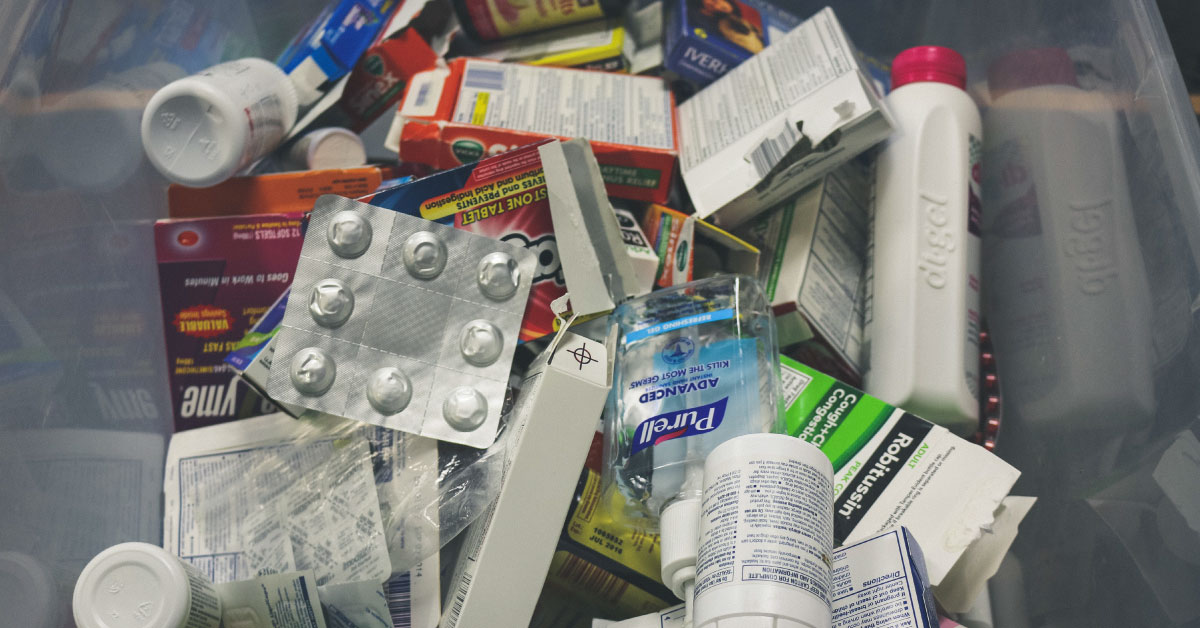Poison Center Announces Spring Medication Cleanout Events
 An important community program started by the Texas Panhandle Poison Center (TPPC) in 2009 will continue in March when the TPPC begins its three-stop spring
Medication Cleanout cycle. The biannual collection will get underway March 24 at the TTUHSC Amarillo
campus. Additional Medication Cleanout collections are scheduled for April 14 in Abilene
and April 28 in Lubbock. The Lubbock date coincides with the U.S. Drug Enforcement
Agency’s National Medication Take Back Day.
An important community program started by the Texas Panhandle Poison Center (TPPC) in 2009 will continue in March when the TPPC begins its three-stop spring
Medication Cleanout cycle. The biannual collection will get underway March 24 at the TTUHSC Amarillo
campus. Additional Medication Cleanout collections are scheduled for April 14 in Abilene
and April 28 in Lubbock. The Lubbock date coincides with the U.S. Drug Enforcement
Agency’s National Medication Take Back Day.
Medication collection at each event runs from 10 a.m. to 2 p.m. However, volunteers are also needed to help set up prior to the collection and to continue logging medications after collection ends. TPPC Managing Director Jeanie Jaramillo-Stametz, Pharm.D., said shifts are generally scheduled from 9 a.m. to 2:15 p.m. and from 1:45 to 5:45 p.m. Volunteers can sign up for one shift or both.
“Medication Cleanout cannot function without the assistance of volunteers, especially TTUHSC students, faculty and staff,” Jaramillo-Stametz stressed. “As always, we really need your help, so please consider participating as a volunteer.”
Training for volunteers is scheduled from 5:30 to 7 p.m. on the Friday before each collection at the Amarillo, Abilene and Lubbock campuses. Jaramillo-Stametz said training is mandatory for all volunteers who have not previously participated.
“We strongly encourage even those who have volunteered before to attend the training,” Jaramillo-Stametz said. “For those who have not volunteered before, Medication Cleanout events are a lot of fun and a great learning and community service experience. You will see firsthand the unbelievable effect of non-adherence, overprescribing and over-marketing. And, the community participants are so grateful for the opportunity to properly dispose of their medications.”
To date, TPPC has conducted 53 Medication Cleanout collections that have resulted in the appropriate disposal of 41,496 pounds of unused or unwanted medications and medical sharps. Jaramillo-Stametz said the events help to reduce accidental poisonings and medication misuse and drug abuse. She said the collections are also a good opportunity for families who have had a loved one pass away to safely dispose of leftover medications.
Image Gallery
Related Stories
Celebrating Veterans: TTUHSC’s General Martin Clay’s Legacy of Service and Leadership
From his initial enlistment in the Army National Guard 36 years ago to his leadership in military and civilian health care management roles, Major General Martin Clay’s career has been shaped by adaptability, mission focus and service to others.
Texas Tech University Health Sciences Center School of Nursing Named Best Accelerated Bachelor of Science in Nursing Program in Texas
The TTUHSC School of Nursing Accelerated Bachelor of Science in Nursing (BSN) program has been ranked the No. 1 accelerated nursing program in Texas by RegisteredNursing.org.
TTUHSC Names New Regional Dean for the School of Nursing
Louise Rice, DNP, RN, has been named regional dean of the TTUHSC School of Nursing on the Amarillo campus.
Recent Stories
The John Wayne Cancer Foundation Surgical Oncology Fellowship Program at Texas Tech University Health Sciences Center Announced
TTUHSC is collaborating with the John Wayne Cancer Foundation and has established the Big Cure Endowment, which supports the university’s efforts to reduce cancer incidence and increase survivability of people in rural and underserved areas.
TTUHSC Receives $1 Million Gift from Amarillo National Bank to Expand and Enhance Pediatric Care in the Panhandle
TTUHSC School of Medicine leaders accepted a $1 million philanthropic gift from Amarillo National Bank on Tuesday (Feb. 10), marking a transformational investment in pediatric care for the Texas Panhandle.
Texas Tech University Health Sciences Center Permian Basin Announces Pediatric Residency Program Gift
TTUHSC Permian Basin, along with the Permian Strategic Partnership and the Scharbauer Foundation, Feb. 5 announced a gift that will fund a new pediatric residency.
